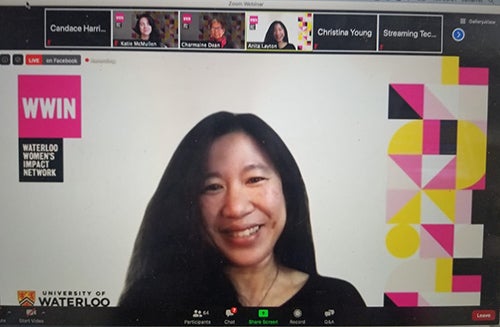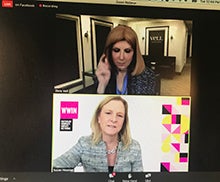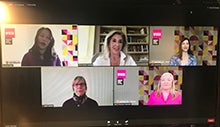Alumni from Canada, the US, Mexico, Costa Rica, Great Britain, Norway, Switzerland and Australia joined together for a virtual celebration of International Women in Mathematics Day on May 12. They attended virtual coffee, multiple panels, a screening of Secrets of the Surface: The Mathematical Vision of Maryam Mirzakhani and connected on social media with the hashtag #IAmGoodAtMath and on the Waterloo Math Digital Community.
The speakers ranged from faculty members, alumni of the Faculty of Mathematics and friends. Some rebelled against studying math and ended up there despite themselves; some loved the challenge; some didn’t know where it would take them. They all agree that their math education gave them a different way of thinking that is logical, rigorous and detailed.
Step outside your comfort zone
For many women, although they felt comfortable with math, they found it challenging to step into classrooms, meetings and board rooms as one of the few women, and sometimes the only woman. Many of the day’s panellists broke the glass ceiling by learning to take risks, building their confidence and travelling to another continent with their family to start a new job.

Our speakers advised that you can’t be afraid to work hard to step out of your comfort zone. Sherry Shannon-Vanstone studied mathematics at the undergraduate and graduate levels and started selling technology. Travelling the world, she still commanded respect in meetings with customers because of her technical knowledge. She told listeners that she tries to live by Eleanor Roosevelt’s words: “Do one thing every day that scares you.”
That’s what creates impact.
It’s about people
Whether you’re leading or following, a mentor or a mentee, the people you choose and how you treat them matters. The lack of female role models could often act as a barrier, though it pushed our speakers to strive for diversity in their teams. Once many of them made their way to the board room, they ensured that every part of the organization they were involved with was diverse.

Heystee also reported that It’s also about checking yourself, asking: Who am I? What do I stand for? What’s my personal brand? She believes that if you surround yourself with people who fit with your values yet have different perspectives, they will impact you, and you, in turn, will impact them.
Giving back

We think of giving back as donating money; however, doing good is about more than that. It could be giving your time, adding your voice to a board, or getting involved in initiatives like Women in Mathematics and Women in Computer Science. Each person needs to find their unique voice and make an impact. Giving back helps organizations do things they’ve never done before, provides mentorship, and help where it’s needed, but for the one giving, there are new ways to learn and people to meet, find ways to shift careers, and it can be incredibly fun and rewarding. Doing good makes an impact on the organization and the people it serves, and on you.
Being good at math opens doors to a wide variety of options and success. Based on the diversity of speakers we heard from, there is no one size fits all for success, though, as Layton reminded us, do what you love.